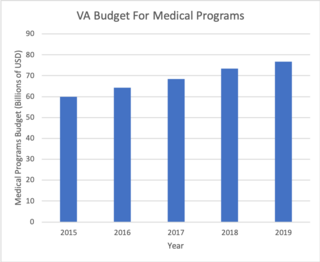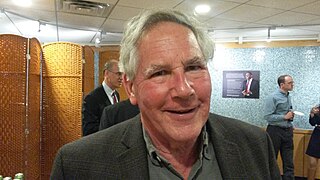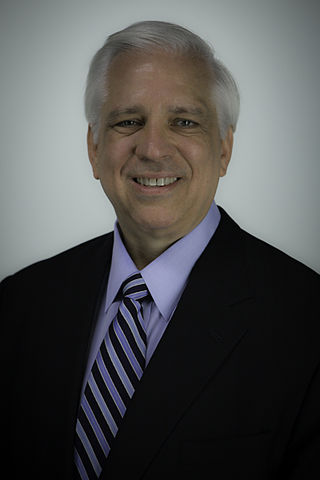
The United States Department of Veterans Affairs (VA) is a Cabinet-level executive branch department of the federal government charged with providing lifelong healthcare services to eligible military veterans at the 170 VA medical centers and outpatient clinics located throughout the country. Non-healthcare benefits include disability compensation, vocational rehabilitation, education assistance, home loans, and life insurance. The VA also provides burial and memorial benefits to eligible veterans and family members at 135 national cemeteries.

William Harrison Frist is an American physician, businessman, conservationist and policymaker who served as a United States Senator from Tennessee from 1995 to 2007. A member of the Republican Party, he also served as Senate Majority Leader from 2003 to 2007. Born in Nashville, Tennessee, Frist studied government and health care policy at Princeton University and earned a Doctor of Medicine degree from Harvard Medical School. He trained as a cardiothoracic transplant surgeon at Massachusetts General Hospital and Stanford University School of Medicine, and later founded the Vanderbilt Transplant Center. In 1994, he defeated incumbent Democratic Senator Jim Sasser.

Louis Wade Sullivan is an active health policy leader, minority health advocate, author, physician, and educator. He served as the Secretary of the United States Department of Health and Human Services during President George H. W. Bush's Administration and was Founding Dean of the Morehouse School of Medicine.

The Veterans Health Administration (VHA) is the component of the United States Department of Veterans Affairs (VA) led by the Under Secretary of Veterans Affairs for Health that implements the healthcare program of the VA through a nationalized healthcare service in the United States, providing healthcare and healthcare-adjacent services to veterans through the administration and operation of 146 VA Medical Centers (VAMC) with integrated outpatient clinics, 772 Community Based Outpatient Clinics (CBOC), and 134 VA Community Living Centers Programs. It is the largest division in the department, and second largest in the entire federal government, employing over 350,000 employees. All VA hospitals, clinics and medical centers are owned by and operated by the Department of Veterans Affairs, and all of the staff employed in VA hospitals are federal employees. Because of this, veterans that qualify for VHA healthcare do not pay premiums or deductibles for their healthcare but may have to make copayments depending on the medical procedure. VHA is not a part of the US Department of Defense Military Health System.

Dr. David N. Sundwall was a primary care physician and served as the executive director of the Utah Department of Health from January 2005 to January 2011.
The National Association for Chiropractic Medicine(NACM) was a minority chiropractic association founded in 1984 that described itself as a "consumer advocacy association of chiropractors". It openly rejected some of the more controversial aspects of chiropractic, including a basic concept of chiropractic, vertebral subluxations as the cause of all diseases. It also sought to "reform the chiropractic profession away from a philosophical scope of practice and towards an applied science scope of practice." It stated that it was "dedicated to bringing the scientific based practice of chiropractic into mainstream medicine" and that its members "confine their scope of practice to scientific parameters and seek to make legitimate the utilization of professional manipulative procedures in mainstream health care delivery." "While the NACM is focused on furthering the profession, its primary focus is on the rights and safety of the consumers." The NACM was the object of much controversy and criticism from the rest of the profession. It quietly dropped out of sight and its demise apparently occurred sometime between May 30, 2008 and March 6, 2010.
The University of Oklahoma Health Sciences Center in Oklahoma City, Oklahoma, United States, is the health sciences branch of the University of Oklahoma. It serves as the primary place of training for many of Oklahoma's health professions. It is one of only four health centers in the United States with seven professional colleges.

The Under Secretary of Veterans Affairs for Health is a sub-cabinet position in the United States Department of Veterans Affairs. Formerly known as the Chief Medical Director of Veterans Health, the Undersecretary is the highest official directly responsible to the Secretary for the Veterans Health Administration, which is the largest agency within the department. Although the position is no longer required to be held by a licensed physician, senior medical professionals such as hospital administrators are typically the preferred selectee for nomination, based on both demonstrated ability in the medical profession or health care administration, and with substantial experience in Veterans healthcare or similar programs.

The Veterans Health Information Systems and Technology Architecture (VISTA) is the system of record for the clinical, administrative and financial operations of the Veterans Health Administration VISTA consists of over 180 clinical, financial, and administrative applications integrated within a single shared lifelong database (figure 1).

David Jonathon Shulkin is an American physician and former government official. In 2017, Shulkin became the ninth United States Secretary of Veterans Affairs and served under President Donald Trump. He was the Under Secretary of Veterans Affairs for Health from 2015 until 2017, appointed by President Barack Obama. On March 28, 2018, President Trump dismissed Shulkin from his position by tweet, and announced that Physician to the President Ronny Jackson would be nominated as Shulkin's successor, although Jackson's nomination was withdrawn on April 26, 2018, after allegations surfaced of misconduct and mismanagement while serving in the White House. He was succeeded by Under Secretary of Defense Robert Wilkie.

Norman Daniels is an American political philosopher and philosopher of science, political theorist, ethicist, and bioethicist at Harvard University and the Harvard T.H. Chan School of Public Health. Before his career at Harvard, Daniels had built his career as a medical ethicist at Tufts University in Medford, Massachusetts, and at Tufts University School of Medicine, also in Boston. He also developed the concept of accountability for reasonableness with James Sabin, an ethics framework used to challenge the healthcare resource allocation in the 1990s.

The Virginia Commonwealth University School of Medicine is the medical school of Virginia Commonwealth University, a public research university in Richmond, Virginia. It is the largest and oldest continuously operating medical school in Virginia. The school traces its beginnings to the 1838 opening of the medical department of Hampden–Sydney College, which in 1854 became an independent institution known as the Medical College of Virginia (MCV). In 1968, MCV joined with the Richmond Professional Institute to form Virginia Commonwealth University. The School of Medicine is one of six schools on VCU's MCV Campus, which includes the VCU Medical Center and Children's Hospital of Richmond at VCU.

Stephen L. Ondra is the chief medical adviser for the MITRE Corporation’s work as operator of the CMS Alliance to Modernize Healthcare federally funded research and development center. Ondra advises all HHS organizations to advance private insurance markets, Medicare and Medicaid, value-based payments, and healthcare quality. Ondra was most recently CEO of Cygnus-AI Inc., a company specializing in artificial intelligence and clinical decision support tools for diagnostic radiology. He was also founder and chief executive officer of North Star Health Care Consulting, and served on the board of directors of Triple-S Management and electroCore. A neurosurgeon and neuroscientist, Ondra has also served in senior positions in the Federal government, having a role in health reform efforts and the implementation of the Affordable Care Act. He advises corporations, provider organizations and early-stage start-ups on the transition to value-based care and health IT strategy.
John D. Halamka, M.D., M.S., is an American business executive and physician. He is president of the Mayo Clinic Platform, a group of digital and long-distance health care initiatives.
Joel Kupersmith, M.D., an American physician, is the former dean of the Texas Tech University School of Medicine, and head of the Office of Research and Development of the Department of Veterans Affairs. He is the former director, Veterans Initiatives and professor of medicine at Georgetown University.

The 2014 Veterans Health Administration controversy is a reported pattern of negligence in the treatment of United States military veterans. Critics charged that patients at the VHA hospitals had not met the target of getting an appointment within 14 days. In some hospitals, the staff falsified appointment records to appear to meet the 14-day target. Some patients died while they were on the waiting list. Defenders agreed that it was unacceptable to falsify data, but the 14-day target was unrealistic in understaffed facilities like Phoenix, and most private insurers did not meet a 14-day target either. By most measures, the VHA system provides "excellent care at low cost," wrote Paul Krugman, who believes that the attacks on the VHA system are motivated by conservatives who want to discredit a government program that works well. Conservative legislators have proposed privatizing the VHA, and legislative reforms that will make it easier for veterans to go to private doctors.

Consuelo H. Wilkins is an American physician, biomedical researcher, and health equity expert. She is Senior Vice President and Senior Associate Dean for Health Equity and Inclusive Excellence at Vanderbilt University Medical Center. She is a professor of medicine in the Department of Medicine, Division of Geriatrics at Vanderbilt University School of Medicine and has a joint appointment at Meharry Medical College. She additionally serves as one of the principal investigators of the Vanderbilt Clinical and Translational Science Award, Director of the Meharry-Vanderbilt Community Engaged Research Core (CTSA) and as vice president for Health Equity at Vanderbilt University Medical Center.

Professor Jonathan Samuel Friedland is a British physician and medical researcher who is Deputy Vice-Chancellor and Professor of Infectious Diseases at St George's, University of London.

SreyRam Kuy is a Cambodian American surgeon, writer, researcher, and healthcare executive.
Kameron Leigh Matthews is an American physician.













